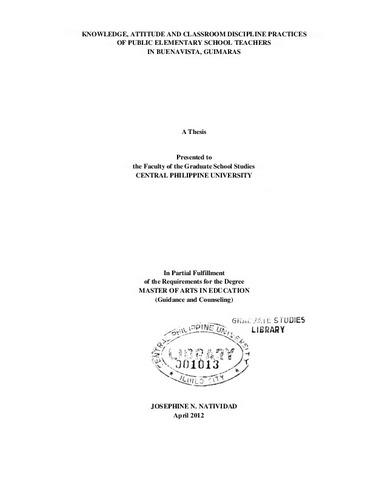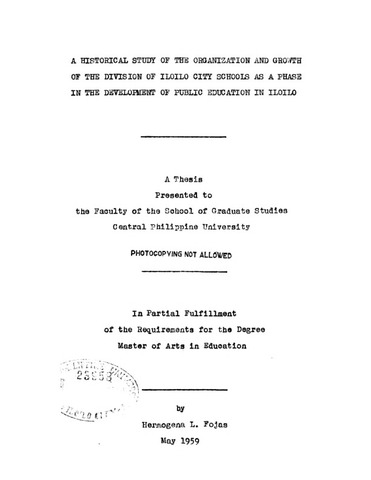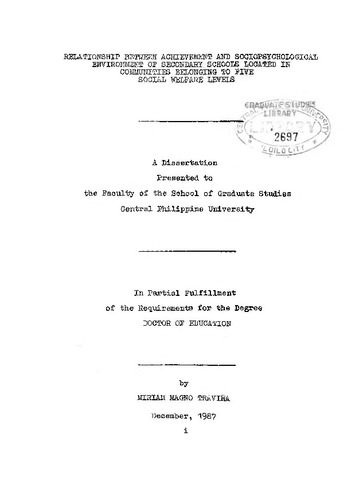Knowledge, attitude and classroom discipline practices of public elementary school teachers in Buenavista, Guimaras

Page views
4,243Date
2012Author
Thesis Adviser
Defense Panel Chair
Share
Metadata
Show full item record
Abstract
Classroom discipline is the process of correcting and moulding the mental faculties and moral characters of pupils inside the classroom. Teachers are the main actors in imposing classroom discipline. The success of the classroom discipline will be the important concern of the teacher.
Teachers are the major contributing factors in the implementation of classroom discipline. Discipline is believed to be an important responsibility of the teachers, who have the freedom to reflect on good behavior. The classroom discipline should be disseminated properly wherein the rules to be expected from students are made clear to them to follow and abide. Good behavior should be rewarded and negative behavior must be given corresponding attention.
This study aimed to determine the knowledge, attitude and classroom discipline practices of public elementary school teachers in Buenavista, Guimaras. Specifically, this study aimed to determine teachers’ (1) personal characteristics in terms of age, sex, and length of service; (2) knowledge on classroom discipline practices; (3) attitudes towards classroom discipline; (4) classroom discipline practices; It also determined (5) the relationship between teachers’ personal characteristics and knowledge of classroom discipline; (6) the relationship between teachers’ personal characteristics and their attitudes towards classroom discipline; (7) relationship between teachers’ personal characteristics and classroom discipline practices; (8) the relationship between teachers’ knowledge and attitudes towards classroom discipline; (9) the relationship between teachers’ knowledge and classroom discipline practices; 10) the relationship between teachers’ attitudes and their classroom discipline practices, and (11) the relationship between teachers’ knowledge and classroom discipline practices when attitude towards classroom discipline practices is controlled.
This study was anchored on the Social Cognitive Theory of Albert Bandura (2001) which adopts an acetic standpoint towards self-development, self-realization, adaptation and change of human behaviour. Bandura asserts that to be an agent of change is to intentionally influence one’s functioning in real life situation. This is evident among people when they are self-organizing, practically self-regulating, self-reflecting and susceptible to life’s changes.
The descriptive correlation research design was employed in this study. The respondents of the study were one-hundred forty-one (141) public elementary school teachers who were chosen from two hundred, twenty two (222) total population from the two districts of Buenavista, Guimaras. Multistage sampling was used to determine the number of respondents of the study. The research instrument used in the study was a researcher made instrument questionnaire which was made up of three (3) parts. Part 1 was to determine the personal information of the respondents such age, sex, civil status and length of years or service. Part 2 consisted of items that determined the knowledge on classroom discipline of the respondents and part 3 assessed teachers’ attitude towards classroom discipline practices, and part 4 was to determine the teachers’ classroom discipline practices. The instrument was subjected to content validation and reliability testing using Cronbach’s alpha. Frequency counts, percentages, means, standard deviation, gamma and Cramer’s V were the statistical tools employed to analyze the data gathered.
The findings of this study revealed that majority of the respondents were ages between 42-51 years old. Most of the respondents were female and had been in the teaching service for 13-18 years. They had high level of knowledge of classroom discipline practices, exhibited favorable attitude towards classroom discipline practices and apparently displayed good discipline practices. There was no significant relationship between personal characteristics of the respondents in terms of age, sex and length of service and knowledge and attitude of the teachers towards classroom discipline.
The results further revealed that there was no significant relationship observed between the personal characteristics and classroom discipline practices of the respondents in terms of sex. However, a significant relationship was shown between the age and length of service and classroom discipline practices of the respondents.
A significant relationship was also shown between the level of knowledge and attitude towards classroom discipline practices of the respondents. Likewise, a significant relationship was found between the level of knowledge and classroom discipline practices of the respondents. In terms of relationship between the attitude and practices towards classroom discipline a significant relationship existed between the two variables. Moreover, teachers’ knowledge and practice of classroom discipline practices were significantly related even if their attitude towards classroom discipline was controlled.
Based from the results of the study, the following conclusions were drawn:
1. There were more female teachers employed in the public elementary schools in Buenavista, Guimaras. Most of them were in their middle-age and experienced various trainings and seminars in order to upgrade their personal growth
2. The respondents were well-informed and fully aware of the classroom discipline practices that they have to implement inside the classroom. They had high level of knowledge on classroom discipline practices. However, there were still public elementary school teachers who were not fully aware of the classroom discipline pattern stipulated in the school handbook.
3. The public elementary school teachers had positive attitude towards the implementation of classroom discipline practices. However, it was found out that a Child Friendly School System greatly affected the implementation of classroom discipline practices of the elementary school teachers. This was probably caused by the massive campaign and close implementation of the Child Friendly Policy by the Department of Education, UNICEF and the Municipality of Buenavista. This inhibits the teachers to implement classroom discipline practices strictly considering the policies stipulated in the child friendly school program.
4. The teachers’ classroom discipline practices were evidently good considering their high knowledge and favourable attitude towards classroom discipline practices. They were employing good classroom discipline practices, implementing various strategies and techniques in dealing with pupils as well as handling classroom discipline problems in accordance to the Mission and Vision of their respective institutions as prescribed by the Department of Education.
5. Knowledge of the public elementary school teachers on classroom discipline practices was highly commendable, efficient and was not affected or influenced by their personal characteristics. Regardless of their age, sex or length of service, the teachers displayed efficiency in employing and imparting their knowledge in educating and moulding the school children in Buenavista, Guimaras.
6. The teacher’s attitude towards classroom discipline practices was independent and not influenced by their age, gender type and how long they were in the teaching service.
7. The teachers, whether male or female were implementing more or less the same classroom discipline practices. However, when the elementary school teachers were classified according to their age and length of service, they vary in their classroom discipline practices.
8. The teachers with high and average knowledge towards classroom discipline practices tended to have a positive attitude towards classroom discipline practices while those with poor level of knowledge also tended to have fairly favourable attitude towards classroom discipline practices.
9. The level of knowledge and practice towards classroom discipline of the public elementary school teachers were dependent of each other. Those teachers with high level of knowledge had better classroom discipline practices than those teachers with only average and low knowledge of classroom discipline practices. The teachers tended to apply and practice their knowledge on classroom discipline practices suited to the individual needs of the pupils.
10. Teachers with favourable attitude had better classroom discipline practices compared to those teachers with poor attitude towards classroom discipline.
11. Even when attitude was controlled the relationship between high level of knowledge of the teachers in classroom discipline practices and their actual practice was still significant.
Based on the foregoing conclusions, the following measures are recommended:
1. Elementary school teachers should maintain the discipline practices for the good of the students. They must also be aware of the laws concerning the imposition of classroom disciplinary practices.
2. The administrators, school heads and principals should distribute copies of the school handbook where the school rules, regulations and disciplinary sanctions are stipulated therein. Teachers must provide copies of school handbook.
4. The Department of Education administration should provide assistance to the teachers in classroom discipline management by means of giving them relevant trainings and seminars so that they will have enough knowledge and skills in the proper administration of classroom discipline management.
5. The district office must hire guidance counsellor/to cater to the needs of the children with special problems related to classroom discipline.
6. Since the data revealed that knowledge, attitude and practice of implementing the program of Child Friendly School System program was low, the management of the Division of Guimaras must design a strategy that will improve teachers’ knowledge, attitude and implementation of the program.
8. A follow up study related to this topic be conducted using a wider area of coverage.
Description
Abstract only
Suggested Citation
Natividad, J. N. (2012). Knowledge, attitude and classroom discipline practices of public elementary school teachers in Buenavista, Guimaras (Unpublished Master's thesis). Central Philippine University, Jaro, Iloilo City.
Type
ThesisSubject(s)
Keywords
Department
School of Graduate StudiesDegree
Master of Arts in Education major in Guidance and CounselingShelf Location
GSL Theses 371.4072 N213
Physical Description
xviii, 86 leaves
Collections
Related items
Showing items related by title, author, creator and subject.
-
Teacher - Librarian Collaboration (TLC) among selected catholic secondary schools in Iloilo City: A basis for a proposed library instruction program
Sefil, Margarito S. (2018)This is a quantitative research which aimed to determine the level of TLC and the factors associated with it among the Catholic secondary schools in Iloilo City. It utilized self-administered survey instruments for teachers ... -
A historical study of the organization and growth of the Division of Iloilo City schools as a phase in the development of public education in Iloilo
Fojas, Hermogena L. (1959)This thesis is the report of a study of the organization as well as the growth of the Division of Iloilo City Schools as a phase of public education in Iloilo for a period of five years. The study covers the period from ... -
Relationship between achievement and sociopsychological environment of secondary schools located in communities belonging to five social welfare levels
Traviña, Miriam M. (1987)This study is an attempt to assess the sociopsychological environment of high schools as perceived by their students and to find out the relationship between academic achievement and sociopsychological environment of these ...





